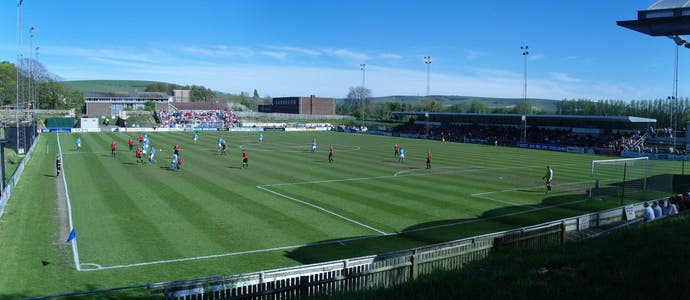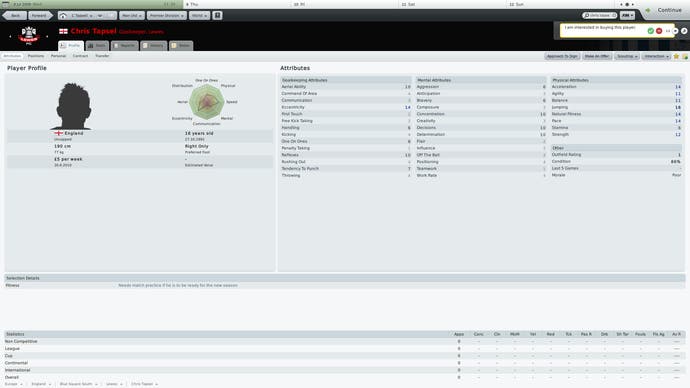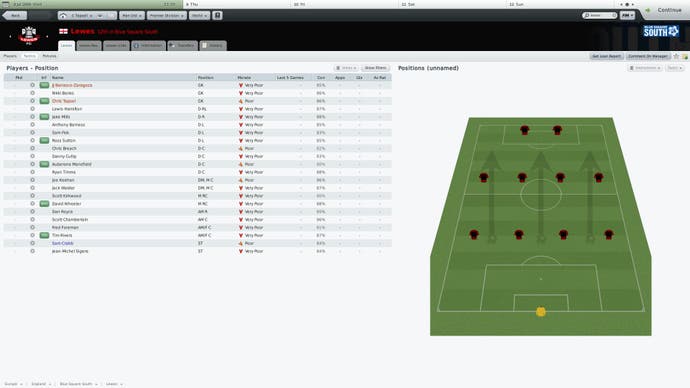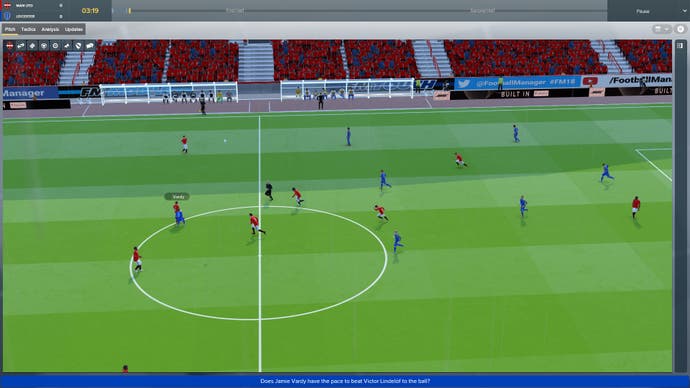I was in Football Manager and I don't know how to feel about it
A specialist in failure.
In 2008, aged 16, I signed for Lewes FC. The club was in ascendancy: newly promoted to the Conference, we had a new stand at the stadium (later paid for by selling our best players, but that's another story), a new Under 18s coach, brought in from the Brighton and Hove Albion academy just down the road, and a new intake of what was, genuinely, the best squad of non-academy players in the south of England.
Most of them came from professional academies like Brighton, Bournemouth and Southampton, some released at the big jump from Under 16s to Under 18s, others who had the chance to carry on but turned it down (and if you're wondering why they might reject something as fabled as an U18's contract - known as a "scholarship" - at a top club by the way, it's probably because that contract entitles you to the sum total of about £60 a week, mandatory residence in "digs" and a BTEC in Sports Bullshit that you have to take instead of college).
Some, like yours truly, came from non-league clubs, having never quite edged their way in on the ground floor. For four years I road-tripped around half the professional academies in the bottom-right corner of the country; three days a week my poor mum picking me up from school and, instead of heading home, handing me a sandwich, a protein bar and a sports drink and driving me two hours down the coast, or up to London, or sometimes just down the road. For those fours years I'd been consistently rejected. From Portsmouth, for a chap they flew in from Argentina, from Charlton Athletic for a lad from the USA, Fulham for the England U16s goalkeeper and from Brighton - twice - for a boy who, to be fair to him, was about twice my height and really very good. But I got into Lewes.
I think I can say that it was a very good team. Lewes U18s won the top division by a good way, and got knocked out of the FA Youth Cup, in the third round, by the Premier League's Hull City. That Hull City then narrowly lost the next round to Manchester United.
I watched that game against Hull from the stands. I'd just partially dislocated my shoulder for what was the fifth time in my life (and not the last), and was waiting for a scan. We lost 1-0. I could have saved the shot - and ahead of the next round there'd absolutely have been a United scout to see it.

Or could I? I don't actually know. It's a long time ago. Maybe I tell myself I could have saved it in a blaze of glory because it made me feel better at the time - "if only I hadn't got injured, I'd have won us the game and got signed by the club I've supported all my life". And then I'd win the lottery and go to the moon. It's embarrassing when you say it out loud, but at sixteen years old, suddenly staring straight at a pile of sagging grades and drifting friends, I think it's probably what I needed to hear.
Either way, around about that time I was also playing a lot of Football Manager. I'd love to tell you there's a complicated psychological thing behind that but it's not really very complicated is it? I couldn't play football so I played a video game about simulating football. And also you could play it with one arm, which helped.
Anyway, when my face (empty silhouette) turned up in FM10 I was absolutely chuffed. You can picture it: me, one arm in a sling, the other clicking away at my spreadsheet video game, a big, stupid grin on my face. I even signed myself for Manchester United. The board really loved that: a club massively in debt wasting time and money on a terrible player, with the legendary Edwin van der Sar on the bench. They didn't fire me though because I won the Champions League (and because I didn't play myself in the final).
As I've got older - not so much growing up as sliding, gracefully, towards my final form of podgy, bitter football dad - I've become less fixated on how brilliant it was to be a player in one of my favourite ever games, and more curious about just how weird my stats were.
I'm 5'11, in the real world (really just a shade under but nevermind that), and in FM10 I'm listed as a whopping 6'2 (in fact it's 190cm, so just a shade over, and I'll take every extra millimetre thanks). My actual birthday is in May, not October. I can go on but best of all, I have a weirdly high rating for Eccentricity, the keeper-only stat which governs how likely one is to do something really bizarre, like dribble the ball up the pitch, or start juggling, or something. I honestly don't know exactly what it does because in my nine or ten years playing the game I've never signed a goalkeeper with high Eccentricity - because, if anything, it just means they'll be a massive liability.
Basically, it's all a bit odd. Football Manager is renowned for the quality of its scouting - Sky Sports famously started getting some players' FM attributes up on a massive screen in their studio, for instance. A lot of clubs are genuinely starting to use it as part of their scouting process for actual humans, presumably filtering out defenders who can't tackle, and goalkeepers with too much Eccentricity. Why were mine so off? What weird thing did I do in a game they watched to make them think I'm so eccentric?
As a spot of half-journalism, half-misguided therapy, I decided to try and track down the scout who watched me.

No dice. I spoke to FM developer Sports Interactive and apparently he left some time ago, and they either can't or won't tell me how to get in touch. I did, however, manage to have a very long chat with a lovely and enormously knowledgeable football man called Dean Gripton, who's Head Researcher of the English Football League (all of the first five tiers below the Premier League) for Sports Interactive. He's so nice that one of the first things he does is accidentally give me hope that I could still make a triumphant, late-20s return.
"I have actually found your profile in the database because, once a player's been created in the database, we never delete them. We mark them 'Not For Extraction' which means they won't be used in the current game, but they're always there, just in case you know... just in case somebody comes back as a non-player, or back to the game at a later age or something like that, or appears at a lower league level.
"So your profile is still there! ID: 29038456, last updated in 2014, which was... 2014 would have probably been the date when we marked you Not For Extraction when we realised that this particular player, as we do..."
He sort of trails off - I think he's being polite. You get the message. By 2014 my footballing career was officially pronounced Dead.
At this point, very early on, I'm starting to realise where this conversation is going. Less therapeutic chit-chat, more deep-dive into a series of accidental-but-nevertheless-brilliantly-delivered burns - from a man I must stress really was lovely - about my ineffectual-at-best playing career.
"I'm just looking at your profile now, " he goes on. "We had 2008: Lewes, no appearances no goals; 2009 Lewes, no appearances no goals. And, I guess we assumed you left at the end of the season, probably." Brilliant.
Cruel truths to one side for a second, FM's scouting really is impressive. There are 770,000 real human beings in their database (only 100,000 or so live in any given game at a time, the rest all marked NFE, like me). Dean, as a head researcher, is in charge of organising the other researchers who individually scout teams. There is a human scout for every single team - barring a few right at the very bottom of the ladder in leagues such as Lewes' - who Sports Interactive "would certainly ask that they try and attend the whole season", home and away.

Usually they're keen enthusiasts - not just fans, but proper enthusiasts - in their own clubs. "Our Cambridge researcher was their club historian, Andrew Bennett who sadly passed away a couple of months ago," he tells me. "Our Chelsea researcher is extremely dedicated, and watches all the U23s and all the U18s games, and is actually probably a little bit more interested in those fixtures than he is the first team."
And they're all volunteers, head researchers aside. Doing it for the love of the game - football and Football Manager - because they want to see their players and their clubs represented as accurately as possible. And, at the top of the game, that absolutely extends to the youngsters coming through.
"Because of course one of the factors that people want to look at with Football Manager - in every new edition - the first thing they want to look at is who are the wonderkids? Who are the kids who are being predicted to be the new stars of the future, and that's the sort of exciting bit... you know, who's considered the best kid at Man United? Who's going to be highly rated at Chelsea who's 18? They're the sort of things that everyone wants to look out for."
Alright, so what about at the lower levels, where it's harder to get researchers dedicated enough to watch Under 23s and Under 18s games week in week out - or even to see those games at all? What about me, basically. At this point, although I'd like to think I was hiding it well, I really just wanted to know if any of it was real. We've talked about the top teams and their youth setups and how it all works. What about my weird stats?
I ask him about my Media Handling trait - I've always wanted to know how they figure these ones out.
"In your particular profile - I'll bring it up here - because you didn't have anything filled in for those traits, and that would be the case for a lot of young players who, you know, it's difficult... we're not really able to have a handle on how determined or ambitious a 16-17 year old may be - so those are left blank and generate automatically by the game so, unfortunately your high volatility in the game - and your high Eccentricity as a goalkeeper - would have been created just solely by fluke in your particular game, and then in somebody else's game, because the attributes are set blank, you may have been created as a Model Pro or a you know a sensible goalkeeper instead of an eccentric one..."

Ah. So not only had I never given them anything to actually go on for the awkward personality stuff, I also hadn't done anything ridiculous? "Oh no you hadn't no, no."
"Unfortunately because you were, in horse racing parlance, 'unexposed', we didn't really have anything to go on - you know, had you gone on to play for the first team and we'd been able to check how you'd responded in those situations then maybe we would've been able to fill in not only the physical and technical attributes, but some of the mental attributes... we do ask people to save those until we're a bit more sure about a player, and a player's more exposed."
So was everything in my report blank?
"I'm afraid so, yes," he laughs. "I'm afraid so."
You can actually pinpoint the second when his heart rips in half. I'm laughing as I'm talking to Dean, but inside I am seizing up and crumbling into dust. It's brilliantly familiar: I've achieved something, I think - I think - but somehow it feels like nothing. In fact it doesn't just feel like nothing - it feels actively like it's a failure. I got into Football Manager but none of my stats are real. How many people can say that? I haven't felt like that since I was 16.
This game is so great at mimicking the real thing that it's actively re-ruining my finest moments in real time. And just like the real thing I think I sort of love it.
If you want to listen to Chris discuss this piece on a dedicated episode of the Eurogamer Podcast, then check out iTunes, Spotify, RSS, and SoundCloud:








.png?width=291&height=164&fit=crop&quality=80&format=jpg&auto=webp)
